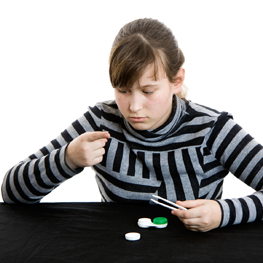
As an optometrist, I am often presented with children and/or their parents expressing an interest in contact lenses. Although this may be a terrifying thought at first for parents, I think contact lenses can be a great addition to glasses, especially if your tween or teen is active in sports, extracurricular activities, or has a higher prescription.
In these specific cases, contact lenses are more stable on the eye when moving, and provide and unobstructed view and better peripheral vision allowing your tween or teen to react quicker to both players and objects, such as balls. They remain clear, regardless of the weather such as rain or snow, and they reduce the risk of injury, as they are more compatible with headgear, goggles, and other safety equipment worn during the activity. Furthermore, an Adolescent and Child Health Initiative to Encourage Vision Empowerment (ACHIEVE) study showed that contact lenses improved how children feel about their physical appearance, their ability to play sports, and their acceptance among friends.
At what age can my child start to wear contact lenses?
I feel this question is dependent upon several factors: the child’s level of motivation, how well they can handle responsibilities such as house chores and schoolwork, and how responsible they are with their personal hygiene and keeping their room clean. These are a few factors that need to be taken into consideration when considering contact lenses for your tween. Ultimately, the decision is made with everyone involved: your optometrist, the parents, and the child.
What types of lenses are best suited for a tween or teen?
During an eye examination with your optometrist, we are able to determine if your tween or teen is a good candidate for contact lenses. We review their vision needs, medical and ocular history, how well they can see and use their eyes together, their prescription for glasses, the health of the eyes, and the curvature of the eyes. If your tween or teen is deemed to be a suitable candidate, we determine what is the best type of contact lens modality for them: a one-day, two weeks, or monthly disposable, rigid gas permeable contact lenses (RGP), or other specialty lenses. My personal preference is a daily disposable lens as there is no cleaning involved, less chance of infection, and increased comfort for the wearer.
On a cost basis, dailies are more expensive than other modalities but if worn part-time, it is quite cost effective as no cleaning solution is required and there is peace of mind that your tween or teen is wearing a fresh pair each time, especially with the dry climate in Calgary.
Will my child be able to insert/remove the contact lenses on their own?
In the same ACHIEVE study, 90 per cent of nearsighted children aged 8 to 11 fit with a one-day disposable lens demonstrated no trouble with insertion or removal of the contact lens without assistance from their parents. In fact, as part of the contact lens fitting process with your optometrist, we train your tween or teen to insert and remove lenses in-office, which can take up to an hour. When we feel they are able to do this on their own, we assess the comfort and vision of the lens in their eye. They are then sent home with the lenses, cleaning instructions and solution, the rules of wearing contact lenses, and a wearing schedule to start practicing and building up their wear time. They return for a follow-up visit to ensure they are seeing well and their lenses are comfortable prior to finalizing them.
It is important to note that improper care of contact lenses can lead to irritation, dry eyes, infections, damage to the eyes, and potential vision loss. Results of the Contact Lenses in Pediatrics (CLIP) study showed that children 8 years of age and older are typically mature enough to independently care for their contact lenses while experiencing few adverse effects. Hence, with proper lens care, compliance, and parental supervision, they should have a healthy and happy experience wearing contact lenses.
As contact lenses are medical devices, it is critical to have your tween or teen’s eyes examined yearly. Besides making sure their prescription is up-to-date, your optometrist is checking the health of the eyes, the curvature of the eyes, and ensuring there are no contact lens complications such as abnormal blood vessel growth related to a lack of oxygen to the cornea from overuse.
There are many advantages to purchasing your contact lenses locally from your optometrist as opposed to an online retailer. Contrary to popular belief, you will find contact lenses fairly priced at your optometrist’s office. You can be rest assured your lenses are authentic and come directly from the manufacturer. As part of your service, if a lens rips or is defective, we can replace it and with our open box policy, if your prescription changes, we can swap out the old lenses even if the box is opened.
If you are interested in contact lenses for your teen or tween, simply schedule an appointment for their annual eye exam and discuss their vision options with your optometrist.
Dr. Farrah Sunderji, OD, completed her Optometry degree from the New England College of Optometry followed by a residency in Paediatrics and Vision Therapy. Her practice, Eyedeology, is located at #245, 520 - 3 Avenue SW. For more information on children’s vision, check out her website, eyedeology.ca.
Calgary’s Child Magazine © 2024 Calgary’s Child